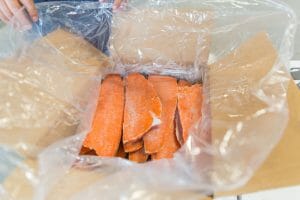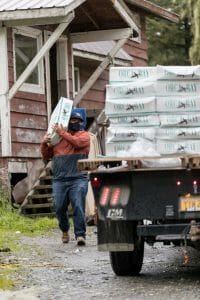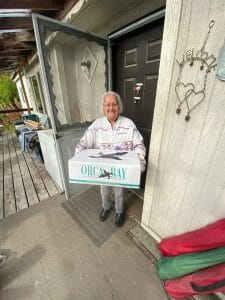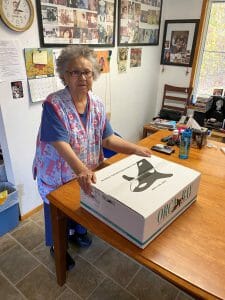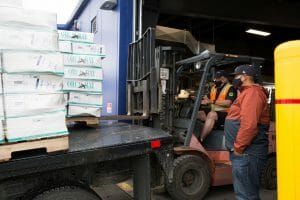(September 25, 2020) – Shareholders from around Southeast Alaska filled their smokehouses, pantries and freezers with the rich red of sockeye salmon this week, courtesy of a unique partnership between Sealaska and the Alaska Longline Fishermen’s Association (ALFA), in conjunction with tribal leadership in each community. The first of its kind, this salmon distribution netted a total of 51,000 pounds of salmon for shareholder families throughout Southeast. Most deliveries were made over the past week, with several more distributions taking place in the coming days.

Communities who rely heavily on subsistence fishing were targeted for the salmon distribution, as the continued economic impacts of the COVID-19 pandemic combined with low salmon returns have disproportionately affected many in subsistence-based villages over the past several months.
“A lot of our people who count on subsistence suffered getting fish this year — there was none, or families weren’t able to get together or travel to their home communities to help with the harvest,” said Clint Cook, president of the Craig Tribal Association. “Distributing fish, in a cultural sense, has a massive impact. There’s nothing that creates greater pleasure than sharing food that is traditional to our people. We all felt that together, the happiness and pride of people receiving this salmon that truly need it.”
The salmon distribution was coordinated through a collaborative partnership between ALFA, Sealaska and tribal leadership in each community. ALFA initially obtained a $250,000 grant to distribute salmon to communities facing food security challenges. The organization targeted Angoon, Hydaburg, Kake and Klawock for the program, based on food security issues each community currently experiences, including a difficult subsistence season. Sealaska acted immediately upon learning of the grant, partnering with ALFA to expand the reach of the program to additional communities: Craig, Haines, Hoonah, Kasaan, Klukwan, Wrangell and Yakutat — all of which face similar adversity related to this year’s poor subsistence runs and high grocery costs in addition to repercussions from the COVID-19 pandemic.

“This program is one of the most positive aspects of this year so far,” said Interim Executive Director Cynthia Peterson of the Yakutat Tlingit Tribe. “Every single household, especially Elders, were so beyond thankful to get their salmon. Receiving a large quantity like this meant that our Elders could work on fish themselves, which inspires a lot of pride. Families around Yakutat are sharing this time putting up fish in smokehouses, canning and processing together. That’s an amazing feeling, knowing that our tribal members have salmon for the winter even in a tough year like this one.”
This distribution impacts communities beyond simply providing food for the winter — it calls back to traditional values. Sharing the wealth and bounty of a good harvest, taking care of others, and considering the needs of Elders, families and our vulnerable neighbors are all parts of Southeast Alaska Native culture that Sealaska is honored to help promote.
“We were raised to share our subsistence harvest,” said Peterson. “This distribution is an amazing way for us to continue that tradition creatively in a year like this one, to provide traditional foods to our tribal members and community who usually rely on subsistence for survival. It’s so good for them to be a part of something like this, to put food in their smokehouses and freezers and canning jars, to know where it came from, continuing those connections. We are so grateful for this entire program and for Yakutat being included. Many thanks to ALFA and to Sealaska for making this happen.”

Collaborating with ALFA to expand the salmon distribution is an example of Sealaska’s ongoing efforts to support our shareholders and grow partnerships during these challenging times. Our culture emphasizes the sharing of resources in times of scarcity, a value that Sealaska continues to act upon in the face of consequences from the COVID-19 pandemic. In April, the Sealaska board approved a $1 million COVID-19 relief and recovery fund, which has since grown to $1.4 million. The funds have been put to use throughout the communities we serve, providing assistance with utilities and other expenses for Elders, feeding schoolchildren and vulnerable families, and much more. Our strength stems in part from lifting each other up in times of adversity. Sealaska meets obstacles with creativity and resilience, forging connections and solving problems with our shareholders in a way that is guided by our history, teachings and way of life.
“It means a lot to see parents provided with the opportunity to pass this cultural knowledge onward to kids, the generation who are just learning how to do it, how to prepare foods, and that was made possible by Sealaska and this partnership even in this challenging year,” said Cook. “I’d like to thank Sealaska on behalf of the Craig Tribe, tribal members, our staff, really our whole community. It’s an absolute honor to be able to provide for our people like this. If it weren’t for this program, it wouldn’t have happened.”
Offering this salmon to communities impacted by hardship is just one way we are proudly investing in shareholders this year. Sealaska continues to seek ways to support our shareholders, building positive partnerships with other organizations to enhance existing programs and create exciting new opportunities.
Heartfelt thanks to our partners at ALFA and tribal leadership in Angoon, Craig, Haines, Hoonah, Hydaburg, Kake, Kasaan, Klawock, Klukwan, Wrangell and Yakutat for making this program a success.
###





